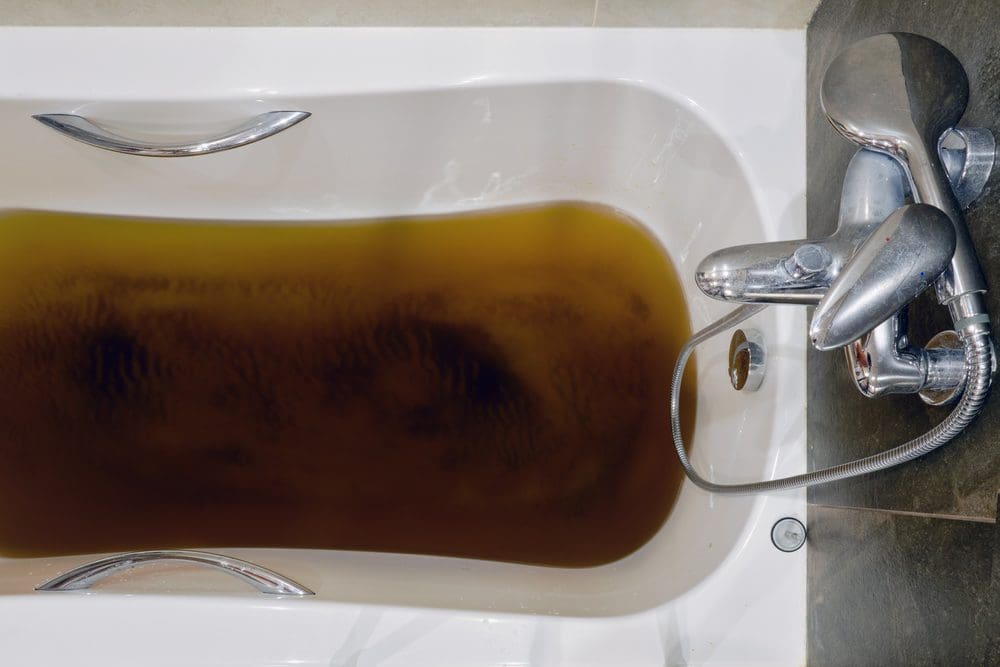Identifying the Causes of Waste in the Bathtub
Identifying the Causes of Waste in the Bathtub
Blog Article
Every person has got their personal rationale in relation to Why sewage is coming up through your bathtub.

Sewage back-up in the bathtub can be an upsetting and unsanitary issue for any property owner. Not just is it bothersome, yet it additionally poses serious health risks and suggests underlying concerns with the plumbing system. Comprehending why sewage is turning up through the bath tub is important for taking appropriate activity to resolve the trouble effectively.
Intro to the Concern
Recognizing the Issue
When sewer starts backing up right into the bathtub, it's a clear indicator of a trouble with the drainage system. The wastewater that must be moving away from your home is instead locating its back into your home, which can lead to significant damage and health hazards.
Possible Reasons
Numerous variables can contribute to sewer back-up in the bathtub. From clogs in the sewer line to issues with the plumbing infrastructure, recognizing the root cause is important for locating a remedy.
Usual Reasons for Sewage Back-up
Obstructions in the Sewage System Line
Among the most usual causes of sewer back-up is an obstruction in the sewage system line. This can happen as a result of the build-up of particles, oil, or foreign things in the pipes, avoiding proper circulation and causing sewer to support into your bathtub.
Tree Origin Intrusion
Tree roots seeking moisture and nutrients can infiltrate drain lines with little splits or joints. In time, these origins can grow and broaden, causing substantial damages to the pipelines and resulting in sewer backup issues.
Aging Infrastructure
Older homes may have outdated plumbing systems that are much more susceptible to rust, splits, and deterioration. As pipes age, they come to be a lot more vulnerable to leakages and blockages, enhancing the chance of sewage backup events.
Heavy Rainfall or Flooding
During periods of heavy rainfall or flooding, the drain system might become overloaded with excess water, creating back-ups and overflows. This can lead to sewage supporting right into bath tubs and various other fixtures inside the home.
Wellness Risks Related To Sewage Backup
Contamination of Water
Sewer back-up can contaminate the water in your home, posturing a serious health threat to you and your family. Exposure to contaminated water can lead to intestinal concerns, skin infections, and other health problems.
Spread of Disease
Sewage consists of hazardous germs, viruses, and parasites that can create a series of diseases, consisting of liver disease, cholera, and gastroenteritis. Entering contact with sewage or polluted surfaces puts you at risk of infection.
Mold Growth
Wetness from sewage backup can create optimal conditions for mold development in your home. Mold spores can intensify breathing issues and cause allergic reactions in sensitive individuals, making prompt cleanup important.
Signs of Sewer Backup
Foul Odors
Undesirable smells emanating from drains pipes or components, especially in the restroom, might suggest sewage back-up problems. These odors are often solid and persistent, indicating a trouble that needs prompt interest.
Slow Draining Fixtures
Bath tubs, sinks, and toilets that drain pipes gradually or otherwise at all could be experiencing sewage back-up. If multiple fixtures are influenced at the same time, it's most likely that the issue stems from an usual point, such as the primary sewage system line.
Gurgling Sounds
Strange gurgling or bubbling sounds originating from drains pipes when water is running elsewhere in your house are indicative of air entraped in the plumbing system. This air build-up can arise from sewer back-up and ought to be checked out immediately.
Immediate Actions to Take
Shutting Off Water System
In case of sewage backup, it's vital to switch off the supply of water to stop further contamination and damage. Situate the primary water shutoff valve in your house and shut it off till the problem can be solved.
Calling a Professional Plumber
Dealing with sewer backup is not a DIY task. Contact a qualified plumber with experience in dealing with sewage-related concerns to evaluate the scenario and do required repair services or cleanups.
Preventing Contact with Infected Water
Till the sewage backup is solved, avoid contact with polluted water to stop the spread of microorganisms and virus. Wear safety equipment if you need to remain in the damaged location and wash your hands thoroughly afterward.
Preventive Measures
Routine Maintenance of Drain Lines
Set up normal examinations and upkeep of your drain lines to determine and attend to possible issues before they escalate right into significant issues. This can include cleaning debris, examining for tree root invasion, and repairing any broken pipelines.
Mounting Bayou Valves
Take into consideration mounting bayou shutoffs in your plumbing system to prevent sewer from receding into your home during periods of heavy rainfall or flooding. These shutoffs automatically close when water starts backing up, securing your property from contamination.
Appropriate Disposal of Household Waste
Avoid purging anything besides bathroom tissue and human waste down the toilet to stop obstructions and obstructions in the sewage system line. Dispose of grease, oil, and other house chemicals properly to lessen the risk of plumbing issues.
Tidying up After Sewer Backup
Disinfection Procedures
Thoroughly disinfect and sanitize influenced locations after sewer back-up to eliminate hazardous germs and avoid mold development. Usage appropriate cleaning items and protective gear to guarantee safe and efficient clean-up.
Remediation of Impacted Locations
Fix any type of damage to flooring, wall surfaces, or components brought on by sewer backup. Relying on the extent of the damages, you may require to replace carpets, drywall, or other products to restore your home to its pre-loss problem.
Why is Sewage Coming Up Through Your Bathtub?
Reasons You May Have Sewage in Your Bathtub
All the drains in your home lead down different pipes to get to the main sewer line. If you’re seeing sewage in the bathtub, the problem is that the main sewer line is clogged up, which is causing the water running through other drains to be pushed back into other pipes. The problem isn’t the bathtub, but the main line. The sewer line can get backed up by anything that goes down the drain, from food waste, hair and soap particles to jewelry or children’s toys. Tree branches or dirt can also impact the sewer line. If you’re seeing sewage in the bathtub, you have a big problem that usually needs a professional plumber. Trying to fix this problem without the right tools or knowledge can lead to bigger plumbing problems.
Fixing a Clogged Sewage Line
Although you shouldn’t try to fix the clogged sewer line on your own, you may be able to mitigate the issue until you can get a plumber to your home. A plunger isn’t going to help, because it won’t be able to reach the sewage drain to unblock the problem.
Turn Off Water
Find the main shutoff valve to your home to turn off the water. This prevents more water from going down the drain which is only going to flow back into your bathtub.
Snake the Toilet and Drain
Start by using a drain pipe snake to clean out the toilet drain. Rotate the snake clockwise when you push the snake down. As you pull it out, the snake should spin counterclockwise. Follow up by snaking out the bathtub drain. If you are successful, both the toilet and shower will drain efficiently. If you’re not successful, you probably have a bigger problem than your tools and experience can manage.
Contact a Professional Plumber
Pros have the tools to find the source of the problem and the experience to manage big blockages without causing more damage to your pipes. It can save you a lot of stress by contacting the professionals sooner rather than later.
Identify the Early Signs of a Clogged Sewage Line
If you’re gearing up for a holiday family gathering or just want to avoid the hassle of a clogged sewage line in your home, make sure you recognize the signs of a clogged sewer line.
Slow drains are a sign of a sewer line problem. Gurgling drains from any drain in your home indicate that you may have an obstruction in the drains. If your toilet keeps getting clogged, it might be a problem with the sewer line. When you see laundry water or water from the dishwasher in different sinks in the home, it’s an indication that your sewer drain is beginning to get backed up. These symptoms can often be “fixed” temporarily to get through a day or week before you start seeing the same problem. When it comes to plumbing problems, you want to fix the root of the problem instead of muddling through. The clog will not go away on its own.
https://handymanconnection.com/mississauga/articles/why-is-sewage-coming-up-through-your-bathtub/

We are very eager about and I really hope you enjoyed my post. Appreciated our blog entry? Please share it. Let someone else discover it. I treasure your readership.
Visit Our Site
Report this page